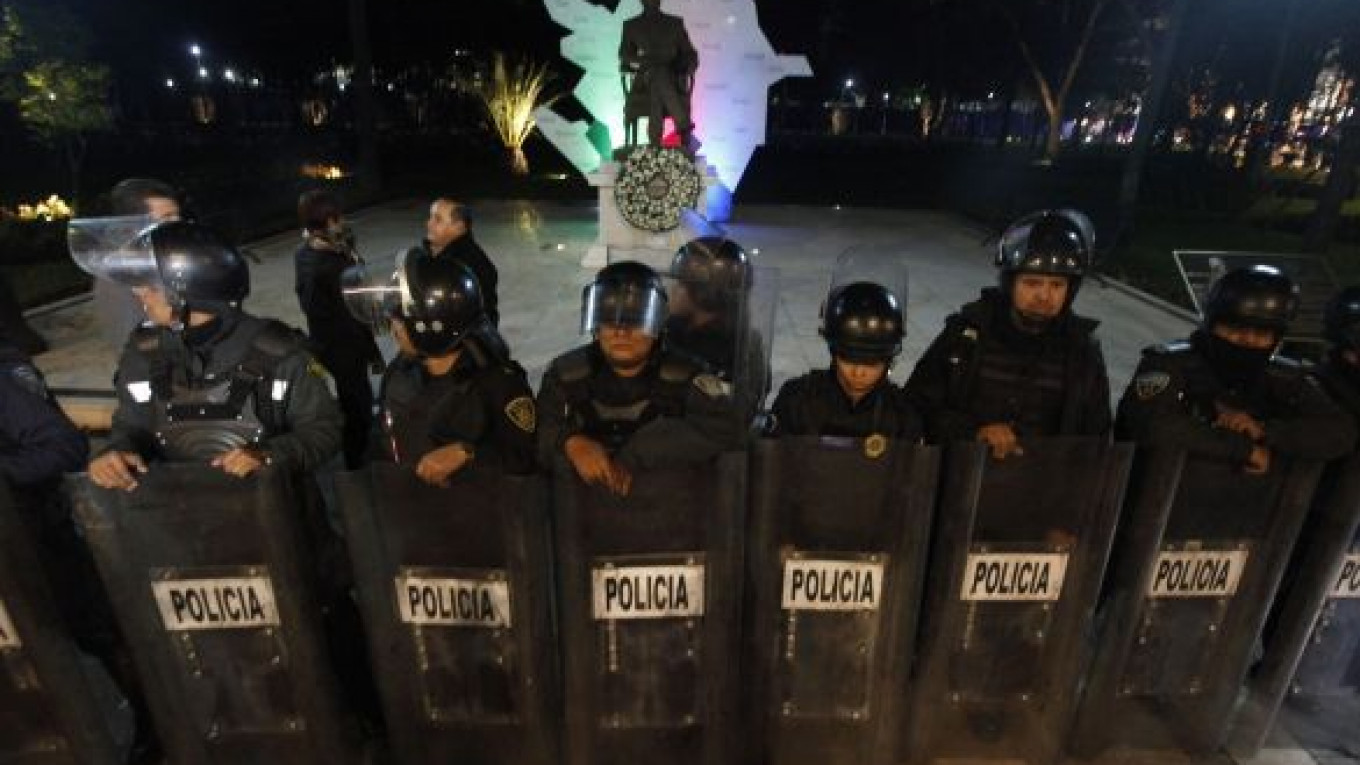MEXICO CITY — Mexico City authorities removed a much-derided statue of the late leader of Azerbaijan on Saturday from a park where it had stood for almost half a year at a prominent spot along the city’s main boulevard.
The city had struggled for months to find a decorous way to address a wave of criticism about the monument to Heidar Aliyev, a former Communist Party boss who died in 2003.
In the end, the city sent police and workers into the park in the predawn darkness Saturday to loosen the life-size, seated bronze statue from its marble plinth, swath it in protective wrapping and haul it away.
The city government said in a statement that it was holding the statue for safekeeping and was still in talks with the Azeri Embassy about where to put it. The statement did not say where the statue had been taken, but local media showed photos of it being hauled on a flatbed truck to a government warehouse in an unfashionable district of the city.
The early-morning removal represented a sharp change of fortunes for the statue, which since August had gazed serenely from a flowery corner of Chapultepec Park over one of the city’s toniest districts, with a marble map of Azerbaijan at its back.
City officials previously suggested that the statue might be moved to an indoor setting, perhaps in some sort of Azeri cultural center.
But the city apparently cannot just hide the statue away, given the $5 million Azerbaijan paid to restore the park, erect the monument and perform other public works.
The Azeri Embassy suggested in a statement in October that removing the statue could affect diplomatic relations between the former Soviet satellite and Mexico. It said the city government had signed an agreement stipulating that the monument be allowed to remain in the spot for 99 years.
Officials of the Azeri Embassy did not immediately answer phone calls seeking comment Saturday.
The city government said it “reiterates its great respect for the Azeri people, their culture and traditions and repeats that it is open to dialogue with their embassy.”
Some Mexico City residents complained about the homage to Aliyev, noting his authoritarian record. The late leader was criticized for repressing opponents and critics in his oil-rich Caspian Sea nation.
The city’s most high-profile street, Reforma Boulevard is best-known for its monuments to Mexican independence heroes. Mexican activist and writer Homero Aridjis, who helped lead opposition to the statue, said Aliyev’s addition there was inappropriate.
Aridjis said he welcomed the government’s move.
“Mexico doesn’t need to import, in exchange for money, tyrants from other countries, nor make others’ conflicts our own,” Aridjis wrote in an e-mail. “We already have enough of our own problems.”
A second Azeri statue appears in Tlaxcoaque Park in downtown Mexico City, which the country also paid to renovate. It depicts a woman, her arms uplifted in mourning, commemorating Khojaly, a village where hundreds of Azeris were reportedly killed during the Nagorno-Karabakh conflict between ethnic Armenians and the Azerbaijan from 1988 to 1994.
Activists objected to that monument because a plaque describes the Khojaly killings as genocide, a term more commonly applied to the slaying of about 1.5 million Armenians in the region in 1915.
Critics also say a monument to Mexican suffering would have been more appropriate for Tlaxcoaque Square, a site once used as a Mexican police interrogation and torture center.
It is unclear what the city plans to do with the Tlaxcoaque monument.
Related articles:
A Message from The Moscow Times:
Dear readers,
We are facing unprecedented challenges. Russia's Prosecutor General's Office has designated The Moscow Times as an "undesirable" organization, criminalizing our work and putting our staff at risk of prosecution. This follows our earlier unjust labeling as a "foreign agent."
These actions are direct attempts to silence independent journalism in Russia. The authorities claim our work "discredits the decisions of the Russian leadership." We see things differently: we strive to provide accurate, unbiased reporting on Russia.
We, the journalists of The Moscow Times, refuse to be silenced. But to continue our work, we need your help.
Your support, no matter how small, makes a world of difference. If you can, please support us monthly starting from just $2. It's quick to set up, and every contribution makes a significant impact.
By supporting The Moscow Times, you're defending open, independent journalism in the face of repression. Thank you for standing with us.
Remind me later.






